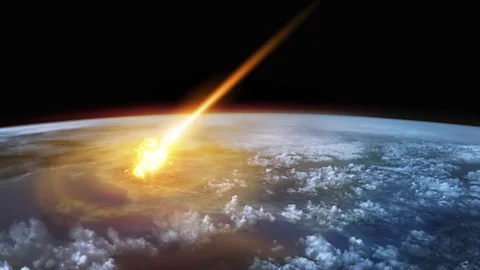Mystery booms: What’s the cause?

Unidentified rumbles and noises like those reportedly heard in the US and UK this week are surprisingly common, says David Robson, and there’s more than one possible explanation.
The beginning of Armageddon, or an alien invasion? Over the weekend, people in the UK and parts of the US were awoken by loud, rumbling noises that were reportedly powerful enough to shake the glass of windows. It wasn’t long before alarmist hashtags, such as #omgwereallgoingtodie, began to appear on Twitter.
There’s no real need to panic, though; mysteriously loud noises have been reported for hundreds of years across the world. In Italian they are called “brontidi” (thunder-like); in Bangladesh they are “Barisal guns”. US citizens call them “skyquakes”, “moodus noises” and in North and South Carolina, “Seneca guns”. The writer Washington Irving even wrote a story about the mystery booms, which he playfully attributed to ghosts playing nine-pin bowling in the mountains.
But, what actually causes them?
There are many potential explanations, according to David Hill, a scientist at the US Geological Survey, who wrote a recent scientific review paper rounding up the causes of “mystery booms”. In coastal regions, for instance, large bangs may accompany humungous waves hitting the cliffs; reports of thunderous sounds are apparently common among big-wave surfers in the US.

Some observers have also reported large rumbles accompanying tsunamis – sometimes alongside mysterious fire balls. For this reason, he proposes that both may come from a belch of methane erupting from “clathrate” crystals on the ocean floor. If that somehow ignites, it would create a massive blow.

Sound unlikely? Even more surprising is the possibility that sand dunes can perhaps rumble like a waking giant. “Under proper circumstances, sand dunes are capable of producing a variety of low-level whispering, whistling, singing, humming, or squeaking sounds, and less commonly, loud booming sounds,” writes Hill – though we are still at a loss to explain how they are producing the noise, he notes.
Hill suspects that earthquakes are to blame in the majority of cases. He’s talking from experience; while in California’s Mammoth Mountain he was surrounded by a muffled booming sound, despite feeling no shaking. On inspecting his instruments he found evidence of small earthquakes less than 4 km (2.9 miles) below the surface. Whereas sounds of deeper earthquakes may be too low for human hearing, he has calculated that judders near the surface could transmit audible noises of the cracking crust.
There are, of course, more exotic explanations – ones that typically involve a government conspiracy. The Daily Mail, for instance, quotes engineers claiming that the bangs in the UK and US closely resemble the noise of “pulse detonation aeroplanes” that can reportedly travel five times the speed of sound. But as the writer points out, it seems unlikely that such noisy spy planes could have been developed and flown without being having been previously detected, or without showing up on satellite surveillance.

After the reports on Saturday, some experts have claimed that they are most likely the sound of a falling meteor. The explanation can perhaps explain some of the historic cases. An 1804 mineralogy book contains the following account from a perplexed curate, for instance:
“I hereby certify to the public, that while I was in Yorkshire near Capt. Topham’s grounds, I heard noises in the air like the report of a cannon at a distance, and at the same time I felt two distinct concussions of the earth, which shook the buildings and the church near the sport where I was at the time. I was very much surprised, now knowing from what such circumstances could arise: within a very short space of time afterwards, I was informed that a stone had fallen within 200 yards of me.”

You might think it unlikely that we would miss the flash of a meteor, but it’s not impossible, as Hill notes: “Because of the time required for a sonic shock wave to reach the Earth’s surface from the upper atmosphere, the visible trace of the meteor has usually vanished before its sonic boom is heard.”
Yet in the end, none of the above offer a definitive explanation of the reports last weekend; for one thing, the noises were apparently too widespread to be attributed to sand dunes, giant waves, or even a meteor landing.

And we can’t rule out the possibility that the reports began with easily explainable phenomena – fireworks, sonic jets, thunder – before being amplified by the crowd’s vivid imagination in Twitter’s echo chamber. Washington Irving’s ghostly game of bowling skittles is perhaps no more fanciful than the stories we can conjure through gossip and hearsay.
